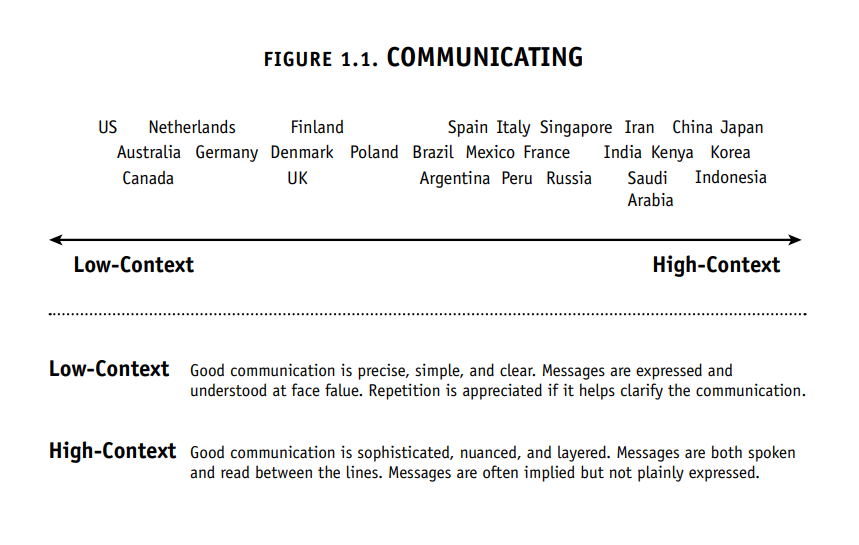People Groups
By Aboshemane
- 4 min read - 674 wordsRace, Ethnicity, and People Groups
Who likes to be classified? 🤔
I do not think most people do. Oddly, we all tend to do it, not only to others, but also to ourselves.
What if I had a choice in the matter?
If I had to be classified, I would desire to be placed in the broadest category to have the most possible freedom - this desire stems from my cultural blind spot. There are communal cultures that view their “groupings” not as a limitation but a freedom. Whereas:
- I reside in the West.
- I am an American.
Innately, I have a sense that individuality equates to authenticity, which may be a projection of a western influence upon my worldview. Nevertheless, I understand some people are okay with political, ethnic, and religious classifications.
Anyhow…
A recent read of The Culture Map by Erin Meyer has broadened my worldview and put words to unspoken thoughts.
Observe the following:

From the image, the author indicates an interesting aspect of communication - that varying cultures lean towards a low-context or high-context.
These varying contexts can create a recipe of miscommunication and disable joint efforts (👉insert no teamwork👈 🥺).
Even without direct experience, we all can imagine a direct person receiving communication from an indirect person or vice versa. If you cannot, it is like mixing boiled eggs, mustard, wasabi, honey, and nonsense.

Our cultural differences extend significantly further than just our customs, food, and language. Our human communicative distinctiveness is not based on vocabulary and spoken language structures alone, but even to how we think.
Tower of Babel
Genesis 11:5 - 9
…Come, let us go down and there confuse their language, so that they may not understand one another’s speech.
There is a large body of science that examines the relationship between the mind and language.1 Linguistics anyone?
When thinking about the Tower of Babel and God confusing the languages of the people. At a glance, one first thinks that only the words were confused among the people of Babel, but it is possible their identities (including not only language, but custom, and thought) and mind were also changed.
What does this mean?
We should incorporate thinking about people groups from a spiritual lens. Christ has redeemed us from the curse of our disobedience including giving us the downpayment or guarantee of our full salvation i.e. the Holy Spirit (Ephesians 1:13-14); as a result, our redemption includes are reunification with not only God but also our fellow man. The reversing of the disunity among redeemed humanity. “Love one another…”
By love
💪We endeavor for Unity💪 ❌Combat Disunity❌
Personally
I pray to seek the reunification of my fellow man actively and purposely. That love is the forefront of all relationships. It is experienced by untangling the disunification of our language, identities, and culture. What makes us distinct no longer separates us, but unite us as one in Christ. We can now be restored through Christ’s mediation on our behalf. The first and foremost is the reunification between us and God, and then second the reunification between us and men.
There is neither Jew nor Greek, there is neither slave nor free, there is no male and female, for you are all one in Christ Jesus. -Galatians 3:28
Activities that has helped unify:
- traveling
- learning language
- doing life with other cultures
Since we are on a journey from disobedience to obedience2 , this path travelled extends from a historical road of how God created distinctions amongst us including both language and thought, and now through the way of Christ, redeems and forgives us. The effects of sin being undone, so that we can reunify: God and man and man and man.
Love is an action. Run from Proverbs 18:1
-
Language and the Brain There are courses that “examine[s] the relationship between linguistic theories and actual language use by children and adults.” ↩︎
-
For as by the one man’s disobedience the many were made sinners, so by the one man’s obedience the many will be made righteous. - Romans 5:19 ↩︎